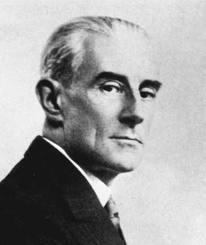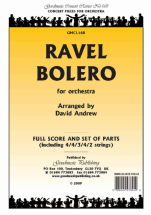Bolero
Buy this item (in stock)
Product ID: GM1 CL168
By Maurice Ravel
Publisher:
Goodmusic
Arranger:
David Andrew
Series:
Concert Classics
Genre:
20th century
Line Up:
Symphony Orchestra
Duration:
15:00
Level: 4
Set & Score
This item is in stock
About this item
The danger of making an arrangement of this masterpiece of orchestration is that many of the inherent qualities of the original will be lost. Here, David Andrew has managed to make it more accessible to standard-sized orchestras without ruining it! The work has not been abridged or especially simplified, but the orchestration has been reduced from Ravel's rather opulent set-up, some instruments have been cued into other parts and the multi-divided string parts have been rationalised to spread the workload.
The two saxophone parts could be played by one player (a separate "doubling" part is enclosed), the high Trumpet in Eb (the part is also shown in D) can be taken by a 3rd clarinet in Bb and the harp and celeste parts could be played by one player on a piano. The two side drum parts specified could be played byone player as long as he or she doesn't mind not having any rest for 15 minutes! The other main differences from Ravel's original orchestra are that oboe d'amore, cor anglais, bass clarinet and contrabassoon are all omitted and four horns here become two. If the A4 sized full score included with the set of parts seems too small, a larger A3 sized one is available separately.
Instrumentation
Piccolo, 2 Flutes (2nd opt.db.Piccolo 2), 2 Oboes, 2 Clarinets in Bb, Soprano + Tenor Saxophones [could be 1 player], 2 Bassoons 2 Horns in F, Trumpet in Eb or D [or Clarinet 3 in Bb], 3 Trumpets in Bb, 3 Trombones, Tuba, Timpani, Percussion (4 or 5
Reviews and rating
No review available, be the first to write one!

Composer
Maurice Ravel (1875-1937)

Joseph-Maurice Ravel (March 7, 1875 – December 28, 1937) was a French composer known especially for his melodies, orchestral and instrumental textures and effects. Much of his piano music, chamber music, vocal music and orchestral music has entered the standard concert repertoire.
Ravel's piano compositions, such as Jeux d'eau, Miroirs, Le tombeau de Couperin and Gaspard de la nuit, demand considerable virtuosity from the performer, and his orchestral music, including Daphnis et Chloé and his arrangement of Modest Mussorgsky's Pictures at an Exhibition, uses a variety of sound and instrumentation.
Ravel is perhaps known best for his orchestral work Boléro (1928), which he considered trivial and once described as "a piece for orchestra without music".
More info about the composer...



 Click above to view samples
Click above to view samples
